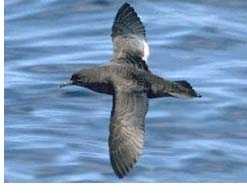Jennifer Lavers (School of Biological Sciences, Monash University, Clayton, Australia) and Alexander Bond, writing in the journal Ecotoxicology and Environmental Safety, have looked at contaminants in Short-tailed Shearwater Puffinus tenuirostris chicks killed for human consumption.
The paper’s abstract follows:
“The Short-tailed Shearwater (Puffinus tenuirostris), or muttonbird, migrates between hemispheres and is subject to an annual harvest at its breeding grounds in Tasmania. As top predators, these seabirds are exposed to high concentrations of contaminants. Concentrations of total polychlorinated biphenyls (PCBs) and 22 elements were determined in Short-tailed Shearwater muscle to evaluate the safety of this meat product for human consumption. Among muscle samples, 57 per cent exceeded food safety standards for either lead (>0.10 μg/g wet weight (ww)) or copper (>0.01 μg/g ww/kg body mass). All muscle samples had total PCB concentrations below the limit of detection (<0.01 μg/g ww). We also sampled feathers to investigate their utility in predicting internal contaminant burdens. Feather-muscle relationships among elements were generally poor, especially for toxicologically important elements (As, Cd, Hg, Pb), limiting the utility of feathers to monitor internal contaminant concentrations. There are no existing monitoring programs for contaminants in harvested wild birds in Australia, and we urge a greater integration between human and wildlife health studies, especially in remote areas where harvesting wildlife is more prevalent, culturally important, and forms a significant component of human diets.”

Short-tailed Shearwater at sea. Photograph by Mark Carey
Reference:
Contaminants in indigenous harvests of apex predators: the Tasmanian Short-tailed Shearwater as a case study. Ecotoxicology and Environmental Safety doi.org/10.1016/j.ecoenv.2013.05.021.
John Cooper, ACAP Information Officer, 25 June 2013

 English
English  Français
Français  Español
Español